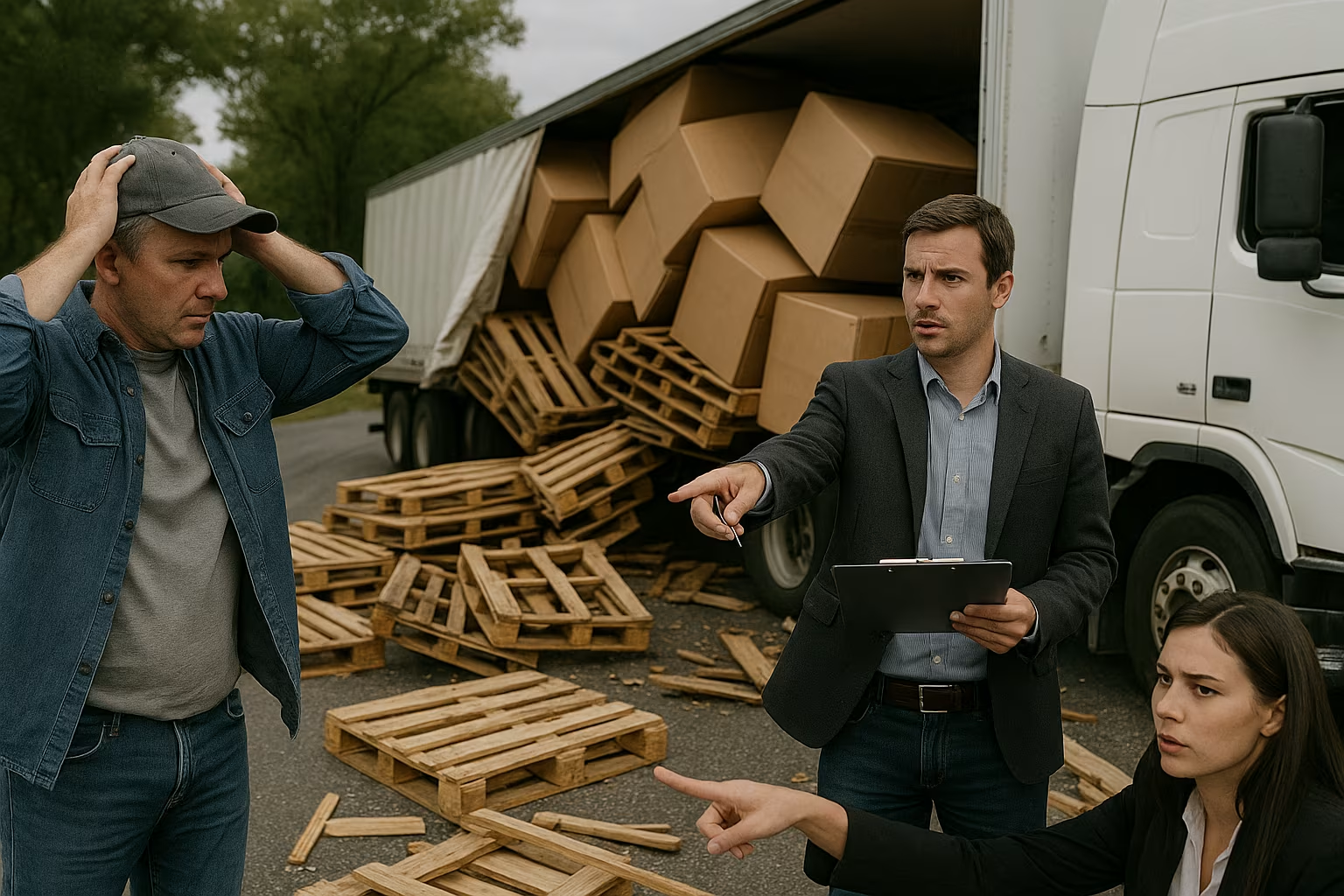Understanding Shifting Cargo Truck Accidents in Texas
Shifting loads and improperly secured cargo cause some of the worst truck accidents on Texas highways. When 80,000 pounds of truck and cargo suddenly become unstable at highway speeds, the results are often deadly rollovers, jackknife crashes, and multi-vehicle collisions.
These accidents happen when cargo isn’t properly secured according to federal rules. During turns, braking, or acceleration, unsecured weight shifts and makes massive trucks uncontrollable. You have legal rights to compensation from the truck drivers, trucking companies, and cargo loading contractors who fail to follow federal safety standards.
At Angel Reyes & Associates, we’ve handled numerous truck accident cases throughout Texas. These crashes involve complex liability issues since multiple parties share responsibility for ensuring cargo stays secure on busy highways like I-35 and I-20 where freight traffic is heaviest.
Why Cargo Security Matters for Your Safety
Proper cargo securement prevents trucks from becoming deadly weapons when loads shift unexpectedly. The physics are unforgiving – when cargo breaks loose, even routine turns or stops can cause massive trucks to rollover or jackknife across multiple lanes.
The Deadly Physics of Cargo Shifts
When cargo isn’t properly tied down or distributed, a simple lane change can trigger disaster. Unlike mechanical failures that give some warning, cargo shifts happen instantly. Truck drivers have no time to regain control before crossing into your lane or rolling over completely.
Texas Highways Create Higher Risk
Texas highways carry enormous freight volumes through major shipping corridors. Interstate 35 from Laredo to Dallas moves billions of dollars in freight annually, while I-10 carries cargo from Houston’s ports statewide.
When trucks on these busy routes experience cargo shifts, multiple vehicles often get involved. The combination of heavy freight traffic and high speeds makes proper cargo securement critical for everyone’s safety.
Beyond the Truck Itself
Unsecured cargo affects more than just the truck carrying it. Loose items fall from trailers, creating road hazards for you and other drivers. Heavy machinery, construction materials, and industrial equipment that falls from trucks causes serious accidents even when the truck itself doesn’t crash.
Warning Signs: If you notice a truck swaying, leaning to one side, or making erratic movements, maintain distance and call 911. These signs often indicate cargo problems that could lead to crashes.
Common Causes of Cargo-Related Accidents
Most cargo accidents result from preventable loading failures and regulatory violations that put profits over safety.
Poor Securement Equipment
Loading crews sometimes use inadequate straps, chains, or barriers that can’t handle the cargo’s weight during transport. Federal rules specify exact requirements for securement equipment based on cargo weight and type, but some companies cut corners with substandard equipment.
Overloaded Trailers
Overloaded trailers that exceed federal weight limits put excessive stress on securement systems and make trucks harder to control. Companies sometimes overload trucks to reduce shipping costs, ignoring federal rules designed to prevent dangerous conditions.
Rushed Loading Procedures
Loading crews face pressure to load trucks quickly without following proper securement protocols. Workers who lack proper training or feel pressured to work fast often skip critical safety steps.
Skipped Safety Inspections
Federal rules require drivers to check cargo securement periodically during trips, but some drivers skip these inspections to save time. Cargo can shift gradually until securement systems fail completely.
Most Common Failures:
- Inadequate tie-downs for cargo weight
- Uneven load distribution creating instability
- Overloaded trailers exceeding federal weight limits
- Skipped cargo inspections during transport
Federal Rules for Cargo Securement
Federal Motor Carrier Safety Administration regulations establish strict standards for cargo securement that apply to all commercial trucks operating in Texas. These rules create specific legal duties for drivers, companies, and loading contractors.
Required Securement Systems
Federal rules specify the types of securement devices required based on cargo weight and type. Requirements include:
- Tie-downs rated for cargo weight
- Proper spacing of restraint devices
- Adequate anchor points in trailers
- Specific techniques for different cargo types
The rules also mandate that securement devices be inspected before each trip and at regular intervals during transport. When companies fail to meet these requirements, they face both regulatory penalties and civil liability for accidents.
Driver Inspection Requirements
Drivers must conduct pre-trip cargo inspections, check securement devices periodically during transport, adjust restraints when cargo shifts, and ensure compliance with weight distribution requirements. Drivers who fail to follow these procedures can be held personally liable for accidents.
Inspection requirements include checking cargo securement within the first 50 miles of a trip and every 150 miles or every three hours thereafter. These inspections must verify that cargo hasn’t shifted and that securement devices remain properly tensioned.
Evidence That Supports Your Claim
Key evidence includes:
- Cargo loading manifests and securement documentation
- Driver logbooks showing inspection compliance or violations
- FMCSA inspection reports and safety ratings
- Photographs of cargo and securement systems after accidents
Understanding these federal rules helps establish when parties violated their legal duties and caused preventable accidents.
Who Can Be Held Liable for Your Cargo Accident
Unlike typical car accidents, cargo-related truck crashes often involve multiple responsible parties due to the complex commercial relationships in freight transportation.
Truck Driver Responsibility
Truck drivers bear primary responsibility for conducting required cargo inspections, properly securing loads according to federal rules, adjusting securement devices when cargo shifts, and refusing to transport improperly loaded cargo. Commercial drivers receive special training on cargo securement and must be licensed to handle these responsibilities.
Trucking Company Liability
Trucking companies face liability through:
- Negligent hiring of unqualified drivers
- Inadequate training on cargo securement procedures
- Pressure on drivers to meet unrealistic delivery schedules
- Poor maintenance of trailers and securement equipment
Companies that prioritize profits over safety often create conditions that lead to cargo securement failures.
Cargo Loading Company Liability
Cargo loading companies and warehouse contractors may share responsibility when they:
- Use inadequate securement devices or techniques
- Improperly distribute cargo weight in trailers
- Overload trucks beyond legal weight limits
- Fail to provide proper documentation about cargo securement
These third-party contractors have specific duties under federal rules and can be held liable when their negligence contributes to accidents.
Equipment Manufacturer Liability
Vehicle and equipment manufacturers become liable in cases involving:
- Defective trailer anchor points
- Faulty tie-down devices or restraint systems
- Inadequate cargo barrier designs
- Failure to warn about proper securement limitations
Shipper and Broker Responsibility
Sometimes shippers or freight brokers contribute to accidents by:
- Misrepresenting cargo weight or characteristics
- Pressuring carriers to accept overloaded shipments
- Providing inadequate securement instructions
- Failing to ensure carriers follow proper procedures
The key to successful cargo accident claims lies in identifying all parties who contributed to securement failures and holding them accountable.
Compensation Available After Cargo Truck Accidents
The severe nature of cargo-related truck accidents often justifies substantial compensation due to the violent nature of rollovers and jackknife crashes.
Medical Expenses and Long-Term Care
Medical expenses typically include:
- Emergency trauma treatment for crushing injuries
- Surgery for broken bones and internal damage
- Rehabilitation for spinal cord and brain injuries
- Ongoing care for permanent disabilities
Unlike car accidents, cargo accidents often cause severe injuries due to the sudden, violent nature of truck rollovers and jackknife crashes. The crushing force can cause internal injuries requiring extensive surgery and long-term care.
Lost Income and Earning Capacity
Lost income compensation covers:
- Immediate lost wages during extended recovery
- Reduced earning capacity when permanent injuries prevent returning to work
- Lost employment benefits including health insurance
- Career retraining costs when physical limitations require new employment
Young victims often face decades of lost earnings when severe injuries prevent them from returning to their chosen careers. Understanding average truck accident settlements can help you know what compensation may be available.
Pain and Suffering Damages
Pain and suffering damages address:
- Severe physical discomfort from serious injuries
- Emotional trauma and PTSD following violent crashes
- Loss of life enjoyment when injuries prevent beloved activities
- Permanent disfigurement or disability affecting quality of life
Texas law doesn’t cap these damages in most personal injury cases. The sudden, violent nature of cargo shift accidents often causes lasting psychological trauma in addition to physical injuries.
Property Damage and Additional Costs
Property damage claims cover:
- Vehicle repair or replacement costs
- Personal items destroyed in crashes
- Rental vehicle expenses during repairs
- Diminished value of damaged vehicles
Wrongful Death Benefits
When cargo accidents prove fatal, surviving family members can pursue compensation for:
- Funeral and burial expenses
- Loss of the deceased’s future financial support
- Loss of companionship and emotional guidance
- Mental anguish suffered by survivors
How Texas Fault Laws Affect Your Claim
Understanding Texas fault laws protects your claim’s value and helps counter insurance company tactics designed to minimize compensation.
Texas Comparative Fault Rules
Texas follows modified comparative negligence, meaning:
- You can recover damages if you’re less than 51% at fault
- Your compensation gets reduced by your fault percentage
- If you’re 51% or more at fault, you cannot recover anything
This system often protects cargo accident victims because these crashes result from commercial cargo securement failures.
Common Insurance Company Tactics
Insurance companies often try to blame victims in cargo accidents by claiming:
- You were following the truck too closely when cargo fell
- You should have anticipated the truck’s instability
- You were speeding or driving aggressively
- You failed to take evasive action when the truck began having problems
However, these arguments often fail because cargo securement is entirely the responsibility of commercial carriers. The reality is that cargo shift accidents happen suddenly without warning, giving other drivers no opportunity to avoid crashes.
How Courts View These Cases
Courts recognize that cargo securement is a specialized commercial responsibility governed by federal rules. The technical nature of these requirements and the sudden onset of cargo shift accidents usually protect victims from significant fault attribution.
Remember: Never accept blame for being “in the wrong place at the wrong time” during cargo accidents. You have the legal right to use highways safely, and trucking companies must ensure their cargo won’t endanger other drivers.
How Angel Reyes & Associates Handles Cargo Cases
Cargo-related truck accident cases require specialized knowledge of federal transportation rules, freight industry practices, and complex evidence preservation that most attorneys don’t possess. These cases demand immediate action to preserve evidence and protect your rights against well-funded trucking companies and their insurers.
At Angel Reyes & Associates, we’ve successfully handled complex truck accident cases across Texas, from Dallas to Houston to rural counties.
Our Specialized Approach
We bring technical expertise in:
- FMCSA cargo securement regulations
- Freight loading and distribution practices
- Truck stability and rollover mechanics
- Supply chain relationships that determine liability
Immediate Evidence Preservation
We act quickly to preserve crucial evidence before it disappears:
- Cargo loading manifests and securement documentation
- Driver logbooks and inspection records
- Truck maintenance files and equipment specifications
- Electronic logging device data
Trucking companies often destroy these crucial records quickly, making immediate action essential.
Multi-Party Coordination
We successfully pursue all liable parties by understanding commercial relationships and insurance structures. Our comprehensive approach includes:
- Investigation of cargo loading and securement practices
- Analysis of federal regulation compliance
- Coordination with freight logistics and accident reconstruction experts
- Aggressive negotiation with multiple commercial insurance carriers
We navigate complex federal trucking regulations, coordinate with medical experts about long-term injury impacts, handle multi-party claims involving drivers, companies, and contractors, and fight for maximum compensation while you focus on recovery.
What to Do After a Cargo-Related Truck Accident
Protecting your health and legal rights requires immediate action after these serious crashes.
Immediate Safety and Medical Steps
Get emergency medical care immediately. Cargo accidents often cause crushing injuries, internal trauma, and spinal damage that may not show symptoms initially but require urgent treatment. Even if you feel fine, adrenaline and shock can mask serious injuries.
Professional medical evaluation ensures proper treatment and creates important records for your legal case.
Evidence Preservation at the Scene
If you’re able, document everything possible:
- Cargo condition and any items that fell from the truck
- Vehicle positions and damage patterns
- Tie-down devices and securement equipment
- The truck’s DOT number and company information
This evidence helps establish how cargo securement failed and can be crucial for proving negligence.
Protecting Your Legal Rights
Avoid discussing fault with anyone except police officers. Insurance adjusters will contact you quickly and try to get recorded statements about your actions before the collision.
Stick to basic facts about what happened and let experienced attorneys handle all communications with multiple insurance companies. Early statements can be taken out of context and used to reduce your compensation.
Why Immediate Legal Help Is Critical
Contact experienced legal help immediately. Cargo-related truck accident cases require specialized knowledge of federal rules, freight industry practices, and complex multi-party liability issues.
Don’t try to handle these claims alone against well-funded trucking companies and their insurers. Time matters critically in preserving evidence and protecting your rights.
Texas Cargo Truck Accident Checklist
☐ Get emergency medical evaluation immediately
☐ Photograph cargo, tie-downs, and vehicle damage
☐ Collect truck DOT number and company information
☐ Avoid admitting fault or discussing your actions
☐ Contact Angel Reyes & Associates for legal guidance
Frequently Asked Questions
What are the dangers of improperly loaded cargo in truck accidents?
Improper cargo can shift suddenly during turns or braking, causing trucks to rollover, jackknife, or lose control. Cargo can also fall from trucks, creating road hazards for other vehicles.
Who is liable for a truck accident caused by shifting cargo in Texas?
Multiple parties may be responsible including truck drivers who fail to inspect cargo, trucking companies with poor training, cargo loading contractors, and equipment manufacturers with defective products.
How do FMCSA regulations impact cargo loading practices?
Federal rules set strict standards for cargo securement, requiring specific tie-down methods, weight distribution, and periodic inspections. Violations can establish automatic negligence.
What compensation is available for victims of cargo-related truck accidents?
Victims can seek medical expenses, lost income, pain and suffering, and property damage. Wrongful death benefits may apply in fatal cases involving cargo securement failures.
How can a lawyer assist in cases involving improperly loaded cargo?
Experienced attorneys investigate cargo loading practices, preserve crucial evidence before it disappears, identify all liable parties, and pursue maximum compensation under federal rules. Learn more about how truck accident lawyers can help your case.















